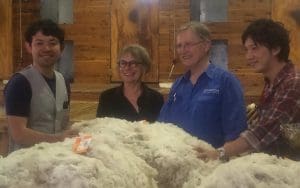 AUSTRALIA’S first wool-growing properties have been certified under the international sheep and wool welfare program, the Responsible Wool Standard.
AUSTRALIA’S first wool-growing properties have been certified under the international sheep and wool welfare program, the Responsible Wool Standard.
The first property to gain farm certification under the third-party audited progam is the north-east Victorian operation Avington at Sidonia, owned by Noel and Lyndsay Henderson.
Another property in New South Wales has also been certified, and others are in the process of applying and/or being audited.
The Responsible Wool Standard has had a mixed reaction among Australian woolgrowers because it only accepts wool from non-mulesed sheep, and has detailed requirements on sheep and land management.
The RWS was developed by the American-based Textile Exchange to protect animal welfare and preserve land health, achieve supply chain traceability and enable brands to communicate this to consumers.
Click here to get the latest Sheep Central story links sent to your email inbox.
International retail brands are behind RWS development

Lyndsay and Noel Henderson, centre, inspect wool with some Japanese visitors.
Avington Merinos principal Noel Henderson confirmed that the property was the first in Australia to be certified under the RWS program.
“We applied in December 2016 because we wanted to benchmark the way we operate against the only international standard that is third party audited for wool growers.
“RWS is a voluntary standard that addresses the welfare of sheep and the land they graze on,” he said.
“Major international retail brands have been behind the development of the RWS to ensure a traceable and auditable process in the supply of wool because that is what their customers want.
“Consumers for some time have been seeking confidence in the methods of primary production, and we see that every day in food items, but now the focus is on wool production as well.”
Mr Henderson said it is disappointing that wool industry bodies in Australia have shown little initiative in the development of standards for wool production.
“There will no doubt be a lot of debate about the RWS, but it is a starting point to improve our industry and have a much closer connection with not only wool processors but the retail customers.
“We found that we had no difficulties in being certified as we have detailed records of all steps along the way to producing our wool,” he said.
“We intend to encourage other wool growers to understand what is involved in the RWS.”
Avington has embraced several animal welfare standards
Avington was established in 1996 in the central Victorian Macedon Ranges, 98 km northeast of Melbourne, Australia. The property has now grown to 2600 hectares and can support 17,000 Merino sheep.
The Hendersons produce award-winning extra ultrafine, ultrafine and superfine wool from 12-17.5 micron. They describe their wool as pearly white, lustrous and soft handling with good crimp definition. Rigorous selection criteria includes staple strength, fleece weight, length, low coefficient of variation (CV) of fibre diameter and nourishment.
Avington has not mulesed sheep since 2011 and has embraced a number of industry standards and guidelines, including New Merino, SustainaWOOL, the IWTO Guidelines for Wool Sheep Welfare and the Australian Animal Welfare Standards and Guidelines. Electronic data collection and recording methods are used to record fleece qualities and assure traceability.
Textile Exchange’s director of industry integrity Anne Gillespie said farm-level certification is happening in United States, South Africa, Uruguay, New Zealand and Australia, in addition to chain of custody certification of supply chain sites in US, China, Europe, UK, Canada, Argentina, Uruguay and Thailand. She said six certification bodies are licensed to work with the RWS: AsureQuality, Control Union, ICEA, LETIS, NSF and OneCert. In addition, OIA is currently in the process of becoming licensed.
Textile Exchange and New Zealand Merino also recently signed a Memorandum of Understanding (MOU) detailing the alignment between the ZQ Accreditation program and the RWS. As a result of this agreement, wool grown under the ZQ Accreditation program (ZQ Merino and ZQ Premium Wool) can now be sold as RWS certified, she said.
At least two Australian-based wool suppliers – Lempriere and New Merino Australia — and fifteen international brands have committed to the ground-breaking wool quality assurance scheme. Melbourne knitting company ABMT Textiles has also committed to the new standard, and Lempriere is involved with the RWS in Australia and South Africa.



Why don’t you contact the organisation and ask them? Not sure where you got the information from, but it’s definitely not a small fortune.
Please tell us how much certification costs — exactly. I believe that it costs a small fortune.